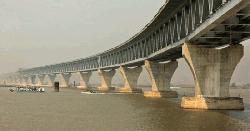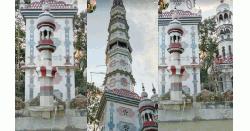| HEADLINE: |
|
Bangladesh to boost spending in next two fiscals to offset Covid impact
|
 Bangladesh to boost spending in next two fiscals to offset Covid impact Expenses incurred by the government of a country on collective needs such as pension, provisions, security and infrastructure are called public expenditure. Such expenses are considered key to staving off a crisis in a nation -- in this case, likely to help Bangladesh offset the adverse impact of the pandemic. The growth of public expenditure for the next two fiscals, in fact, will be 7.56% and 13.8%, respectively, according to a government estimation. The decision has been taken keeping in mind the long-term development as well as the present situation, as per a document, a copy of which is in possession with UNB. The public expenditure for the current fiscal has been pegged at 17.9 % of GDP, while it was kept unchanged in the revised budget of the last financial year. The public expenditure was 13.8%, 13.9%, 13.6%, 14.3% and 15.4% in 2014-15, 2015-16, 2016-17, 2017-18 and 2018-19 fiscals, respectively, according to an official document. "In the mid-term, the target of the government is to limit the budget deficit through maintaining tolerable path with integrated efforts. Later, the main aim of the public expenditure will be to reduce the loses of the coronavirus pandemic and assist in attaining the desired economic growth," the document states. As a result, in 2019-20 fiscal, the public expenditure was reduced to 17.9% from 18.1% in the revised target. "Moreover, in 2022-23 fiscal, the target for public expenditure has been estimated at 17.2% of GDP,” the official document says. It states that the growth in public expenditure was 10.5% in 2014-15 fiscal, 14.9% in 2015-16, 11.9% in 2016-17, 19.8% in 2017-18 and 21.6% in 2018-19. The growth in the last fiscal was 28.1% (revised) when the whole economy was in a standstill due to the pandemic. In the budget of the current 2020-21 fiscal, the growth in public expenditure has been fixed at 13.2%. To bring the economic activities back on track, the Bangladesh government announced stimulus packages worth USD 14.1 billion, equivalent to around 4.3 percent of the country's GDP, in the last quarter of the 2019-20 fiscal. The packages included incentives for export-intensive industries, funds for safety and security of the workers, working capital for small and medium enterprises, loan facilities for export growth, assistance to farmers and agriculture, loan for employment generation, interest relief for businesses, refinancing schemes and insurance cover for health workers. For implementing the stimulus packages, the government had rolled out four work plans over the immediate, short and long terms basis to offset the possible adverse impact of Covid on the country's economy. These included increasing public expenditure, introducing fiscal packages, expanding social safety net programme and increasing the money supply. In public expenditure, job creation was given priority and foreign trips and luxury expenses were discouraged. And as the loan-GDP ratio of the country at just 34 percent gives it breathing space, the government can afford to explore deficit financing for excess public expenditure without significantly impacting the macro economy. Through the banking system, some loan facilities were introduced with lower interest rates. The main aim of these loans was to revive the economic activities, keep employees in their respective jobs and intact the capability and competitiveness of entrepreneurs. To meet the basic rights of people living below the poverty line, daily wagers were covered under social safety net programme. About increasing the money supply, Bangladesh Bank has already reduced the cash reserve ratio (CRR) and repo rate to increase the flow of money which will continue in the coming days as per the demand. CRR is the percentage of cash required to be kept in reserves, vis-a-vis a bank's total deposits, while repo is the rate at which a central bank lends funds to commercial banks.
|
Latest News
Popular News
Editor: Dr. Kazi Ertaza Hassan
All right reserved
South Western Media Group
© Daily Peoples Time
News & Commercial Office:93, Kazi Nazrul Islam Avenue, Kawran Bazar, Dhaka-1215
Phone: 88-02-41010087, 41010086, Fax: 88-02-41010085, Advertising: 88-02-41010084
E-mail: [email protected]








 The anti-Sheikh Hasina brigade has been paid back fair
The anti-Sheikh Hasina brigade has been paid back fair  Badruzzaman Badrul, the expatriate son of a brave martyr
Badruzzaman Badrul, the expatriate son of a brave martyr  Minar-e Kabir is a minaret located in Sugandia village
Minar-e Kabir is a minaret located in Sugandia village  Bashundhara Group, the country’s largest business conglomerate, has been
Bashundhara Group, the country’s largest business conglomerate, has been 



